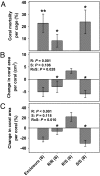Herbivore species richness and feeding complementarity affect community structure and function on a coral reef
- PMID: 18845686
- PMCID: PMC2565647
- DOI: 10.1073/pnas.0801946105
Herbivore species richness and feeding complementarity affect community structure and function on a coral reef
Abstract
Consumer effects on prey are well known for cascading through food webs and producing dramatic top-down effects on community structure and ecosystem function. Bottom-up effects of prey (primary producer) biodiversity are also well known. However, the role of consumer diversity in affecting community structure or ecosystem function is not well understood. Here, we show that herbivore species richness can be critical for maintaining the structure and function of coral reefs. In two experiments over 2 years, we constructed large cages enclosing single herbivore species, equal densities of mixed species of herbivores, or excluding herbivores and assessed effects on both seaweeds and corals. When compared with single-herbivore treatments, mixed-herbivore treatments lowered macroalgal abundance by 54-76%, enhanced cover of crustose coralline algae (preferred recruitment sites for corals) by 52-64%, increased coral cover by 22%, and prevented coral mortality. Complementary feeding by herbivorous fishes drove the herbivore richness effects, because macroalgae were unable to effectively deter fishes with different feeding strategies. Maintaining herbivore species richness appears critical for preserving coral reefs, because complementary feeding by diverse herbivores produces positive, but indirect, effects on corals, the foundation species for the ecosystem.
Conflict of interest statement
The authors declare no conflict of interest.
Figures




References
-
- Cardinale BJ, et al. Effects of biodiversity on the functioning of trophic groups and ecosystems. Nature. 2006;443:989–992. - PubMed
-
- Hooper DU, et al. Effects of biodiversity on ecosystem functioning: A consensus of current knowledge. Ecol Monogr. 2005;75:3–35.
-
- Duffy JE. Biodiversity and ecosystem function: The consumer connection. Oikos. 2002;99:201–219.
-
- Duffy JE. Biodiversity loss, trophic skew and ecosystem functioning. Ecol Lett. 2003;6:680–687.
-
- Jackson JBC, et al. Historical overfishing and the recent collapse of coastal ecosystems. Science. 2001;293:629–638. - PubMed
Publication types
MeSH terms
LinkOut - more resources
Full Text Sources

